Tara Chevrestt's Blog, page 57
May 16, 2014
Fair Play (It Happened at the Fair #2) by Deeanne Gist
 Her mother had spent every last minute cooking for Papa, cleaning for Papa, looking nice for Papa, entertaining for Papa, producing babies for Papa. The measuring stick she used to judge herself was based on how pleased or displeased Papa was with her, their home, and her ability to raise their children properly.
Her mother had spent every last minute cooking for Papa, cleaning for Papa, looking nice for Papa, entertaining for Papa, producing babies for Papa. The measuring stick she used to judge herself was based on how pleased or displeased Papa was with her, their home, and her ability to raise their children properly. The very thought of being measured by that same stick horrified Billy. She couldn't think of anything worse. As far as she was concerned, domesticity was nothing more than a glorified jail sentence.
Having thoroughly enjoyed It Happened At the Fair, I was more than eager to read the latest installment from Gist. Though I don't like it as much as the first one, mostly because that story line about deafness and lip-reading really touched a chord with me, I still really liked this story.
We have a spunky woman doctor who knows how to stand on her own two feet and give back what for. Especially when she meets a manly Texas Ranger who has very set ideas about women's place.
Boy, does she manage to convert him, quickly. With her actions and her bravery, she leaves no doubt just how much women are capable of, forcing this Texas Ranger to rethink some of his thoughts about women and what they're capable of. She even helps him get better.
As always with a Gist book, there's a lot of humor and chuckles. There's no end to the interesting characters either. I sincerely hope there's a book three in this series, maybe about the women of Hull House? I'm hint dropping...
We meet not only these amazing women (who really existed!) that started a daycare/nursery in the worst part of town and ran it despite the odds and hoodlums, but we also meet some street children--not all of them bad--who've been dealt a difficult hand and have to make the most of it. The hero and heroine start a playground for them, hoping it will help keep the kids off the streets. The book also shows us how some of the immigrants lived and the appalling prison conditions. This is a fun historical novel that will teach you something. It's not fluff. There's even a trial toward the end, and I sure do love those.
Though a Christian fiction in classification, there was absolutely nothing preachy about it. Matter of fact, I think Christian fiction is the wrong category for this. It's just a clean historical romance. There is a stronger...sexual awareness...between Billy (the heroine) and Hunter (the hero) than found in most Christian fiction novels, but while I noticed and was surprised by it, I wasn't bothered by it at all. It's a fact of life, be you Christian, Atheist, or anything else; you're going to feel sexual attraction, so I applaud Gist for toeing the line a wee bit. It made it REAL. BUT there is NO nastiness.
I also appreciated the theme of women working and how Hunter gets a taste of his own medicine. Why should anyone give up something they love doing/feel passionate about?
A thoroughly enjoyable novel. It made me laugh, warmed my soul, and taught me a lot of Chicago history, from prisons to playgrounds. Well done.
I received a digital ARC of this via Edelweiss. Quotes may be different in the final version.

Published on May 16, 2014 00:00
May 15, 2014
Affair in Athens: Greek American Romance Heroine Lives Her Truth
It’s been a long time since I’ve read a contemporary romantic thriller like Affair in Athens by Matina Nicholas. The aspects of its description that most interested me when I agreed to review it were the mentions of Greek resistance to the Nazis during World War II, and the Roma or Rom otherwise known as gypsies. These topics dovetail with my interests in history and minorities. Yet neither of these subjects are major focuses of the plot. I won’t say that they are completely unimportant to the book, but any reader who chooses to read Affair in Athens because it deals with these subjects will be disappointed.
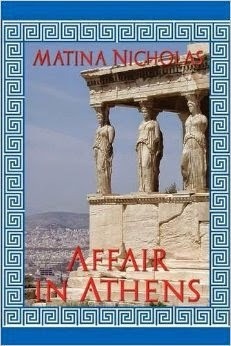
The main focus of the book is unapologetically on heroine Athena Vallas’ romantic life. I realized that when the research on the book she intended to write about her grandfather’s heroic work in rescuing Salonika’s Jews was glossed over. We don’t see her conduct even one interview with a Jewish survivor. On the other hand, this novel has a great deal more historical and cultural content than contemporary romantic thrillers usually do.
I would also like to applaud the characterization of Athena. Even though I didn’t always agree with the reasons behind Athena’s decisions, I did think that she made the right ones. She maintained her self-respect, and steered clear of involvement in illegal and destructive activities. She consults friends and relatives, but makes her own choices. She is strong, loving and nurturing.
I did think that her friend, the gay painter Byron Dillon, was more than a bit stereotypical. I wish that more authors would be willing to challenge themselves to create gay characters who are as complex as their heterosexual characters.
In contrast, Luke Lambros is the most multi-faceted character in the book. He exhibits the entire spectrum of traits. His background and motivations remain at least partly mysterious throughout the narrative. As a man of secrets, he reminded me of a number of well-known literary characters. I wouldn’t be surprised if author Matina Nicholas drew on literary sources to create Luke.
Although I might have preferred to see Athena doing her work as a scholar, and a more nuanced portrayal of the Rom characters, what we do get in Affair in Athens is a fairly well-written novel that affirms both the independence of women and the value of family.
Editor Rosa Sophia sent me a copy of this book in return for an honest review.

Published on May 15, 2014 00:00
May 14, 2014
Ten Questions from Tara: Interview with Alethea Williams
 Tara: Welcome. You’re here to promote Walls for the Wind, a Western historical novel. Tell me, please, what was the inspiration behind this story? How did it come to you?
Tara: Welcome. You’re here to promote Walls for the Wind, a Western historical novel. Tell me, please, what was the inspiration behind this story? How did it come to you?Readers, here's the blurb real quick: Can an angel survive Hell on Wheels? When Kit Calhoun leaves New York City with a train car full of foundlings from the Immigrant Children’s Home, she has no clue she might end up as adoptive mother to four of them in rip-roaring Cheyenne, Wyoming. Kit has spent her life in the Children’s Home and now she rides the Orphan Trains, distributing homeless children to the young nation’s farmers as fast as the rails are laid.
The first time handsome Patrick Kelley spies Kit in Julesburg, Colorado Territory, he wants her. But circumstances, and a spectral-looking demented gambler as well as Kit’s certainty no one in his right mind would want her cobbled-together family, conspire to keep them apart. As Patrick and Kit and her brood ride Hell on Wheels into their destiny, they’re all forced to leave behind everything they knew and forge new lives in the raw American West.
Alethea: Hello. I am pleased to be here today. An article on orphan trains caught my attention years ago. At that time there was little published about the beginnings of any kind of social services in the U.S., or the trains that ultimately carried hundreds of thousands of orphaned and abandoned children from the big cities of the east to be indentured to the expanding nation’s farmers.
Tara: We focus a lot on heroines here on Book Babe. Tell me what makes your heroine(s) strong.
Alethea: Kit Calhoun is an orphan of Irish immigrants to New York City. She grew up in the Immigrant Children’s Asylum, to which she returns at age twenty-two with a sense of mission. At first she takes to the streets to find unwanted children, and then advocates to the courts to gain custody of them. Later, she becomes placing agent to the asylum and begins to accompany the orphans west on the trains, trying to find them homes. But on one journey she reaches the end of track with four orphans still on her hands, and she must decide if her fate is to the many who need her help—or just these four who have become close to her heart.
Tara: Do you see any of yourself in her?
Alethea: I think a bit of the author is in every character she creates. If not bits and pieces from her actual history, then things she wishes she had the courage to do.
Tara: What makes her sexy?
Alethea: Kit doesn’t realize she is beautiful. The second-hand clothes she wears are not flattering, and she is much too busy tending to the needs of others to see the attractiveness of the face that looks back at her from the cracked mirror in the asylum’s dormitory.
Tara: I like that answer. A truly sexy woman doesn't realize it, doesn't even work at it. What kind of research did you do when you penned this novel? Did anything surprising come up in your search?
Alethea: I intensively researched the post-Civil War years, the orphan trains, and the transcontinental railroad. What struck me was the plight of the immigrants, especially the Irish, who came to escape horrible circumstances at home only to die early deaths here of disease, accidents, and alcoholism. The descriptions of the Five Points area of New York, where people lived belowground like rats, was especially eye-opening. We tend to think now that there might have been a better solution to the fact of children living on the streets than shipping them out in rail cars, but a number of them were volunteers, who wanted to escape the conditions in the city and perhaps find something better in the country.
Tara: I can understand that. That's sad. What would you like readers to gain from reading your book? Is there a strong moral? Do you hope they will laugh, learn something, ponder a point?
Alethea: I enjoy history and historical research so much, I hope I can impart some of that love. I would like to think I brought alive another little piece of time in our history.
Tara: Now let’s talk about your hero. What draws the heroine to him? Is he based on a real man in your life by any chance?
Alethea: One of the joys of writing is being able to conjure up the perfect man. I always fall in love a little with my hero, and so far he is my true dream man. Patrick Kelley was not based on any living person or any one I ever knew. Not even a little.
 National Orphan Train Museum, WikiCommonsTara: Your book takes place from New York City to Cheyenne, Wyoming, Dakota Territory. If I were a tourist, what would you recommend I see in this town/country?
National Orphan Train Museum, WikiCommonsTara: Your book takes place from New York City to Cheyenne, Wyoming, Dakota Territory. If I were a tourist, what would you recommend I see in this town/country?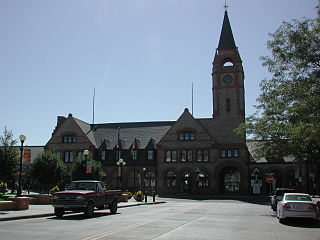 Cheyenne Depot Museum, WikiCommonsAlethea: You would have a long journey with much to see! From the towering buildings of New York, to the Tenement Museum there, to the plains of Kansas and the Orphan Train Complex, and on to Cheyenne, Wyoming, to the refurbished old Union Pacific train station, the Cheyenne Depot Museum, you could ride the trains west as the orphans did and immerse yourself in the past.
Cheyenne Depot Museum, WikiCommonsAlethea: You would have a long journey with much to see! From the towering buildings of New York, to the Tenement Museum there, to the plains of Kansas and the Orphan Train Complex, and on to Cheyenne, Wyoming, to the refurbished old Union Pacific train station, the Cheyenne Depot Museum, you could ride the trains west as the orphans did and immerse yourself in the past.Tara: That actually sounds like a good idea! A more personal question. What’s the one thing you hope to accomplish before you die? Your main goal?
Alethea: I wanted to be published! I wrote seven books over a period of twenty years, and in the last two years I have had five of them published under two different pseudonyms. I have two more to go plus new work. One of the two older manuscripts has been rejected many, many times but I haven’t given up hope of seeing it in print one of these days.
 Bob.Tara: I’m a dog mom, so I always ask this. Do you have pets? If so, tell me about them and do provide pictures.
Bob.Tara: I’m a dog mom, so I always ask this. Do you have pets? If so, tell me about them and do provide pictures.Alethea: At one time my husband and I had four dogs, two cats, and a parrot. All are gone now except Amazon parrot Bob, who has been with me more than 30 years. Maybe one day when I have more room, I will think about getting another dog.
Tara: Alethea (I love that name, by the way), thanks so much for being here today. I wish you the best of luck with your book and those yet unpublished manuscripts you mentioned above. I'm so glad you're achieving your dreams. :)
***Alethea's Bio:Western history has been the great interest of my adult life. I've lived in Wyoming, Colorado, and Oregon. Although an amateur historian, I am happiest researching different times and places in the historical West. And while staying true to history, I try not to let the facts overwhelm my stories. Story always comes first in my novels, and plot arises from the relationships between my characters. I'm always open to reader response to my writing.
Website: http://aletheawilliams.weebly.com/
Blog: http://www.actuallyalethea.blogspot.com/
Facebook: https://www.facebook.com/AletheaWilliams.author
Google+: google.com/+AletheaWilliams
Twitter: @ActuallyAlethea https://twitter.com/actuallyalethea
Goodreads: http://www.goodreads.com/author/show/5753104.Alethea_Williams
LinkedIn: http://lnkd.in/by89znA
Amazon author page: http://www.amazon.com/Alethea-Williams/e/B0077CD2HW/ The Romance Reviews author page: http://www.theromancereviews.com/ActuallyAlethea
And for those of you interested in purchasing her books...
Published on May 14, 2014 00:00
May 13, 2014
Benedict Hall (Benedict Hall #1) by Cate Campbell
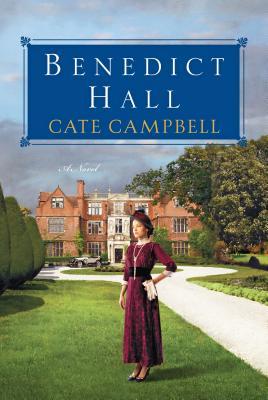 I really enjoyed this story and became invested in most its characters. Love the 1920s time period, Seattle setting, lady doctor, and her love interest. Especially appealing to me is the appearance of William Boeing, his plant, and his seaplane business that later became a huge aircraft company that now makes half the commercial aircraft in use. As an aircraft technician, those bits, however few, made me like the book even more.
I really enjoyed this story and became invested in most its characters. Love the 1920s time period, Seattle setting, lady doctor, and her love interest. Especially appealing to me is the appearance of William Boeing, his plant, and his seaplane business that later became a huge aircraft company that now makes half the commercial aircraft in use. As an aircraft technician, those bits, however few, made me like the book even more.The heroine is too cool for words. She's a very determined doctor who keeps her cool no matter what. She even saves the hero...in a way. I don't want to give too much away so will leave it at that.
There's much ado about the hairstyles and hemlines of the period, the clothes, the attitude of people toward both women and men who have returned from the Great War. I feel Frank's difficulties with his amputation made a superb side story. Too often people view handicaps as a reason to be pitied or their ignorance causes them to treat the handicapped differently, and not in a good way.
All that being said, I do think the evil brother Preston is just a tad OTT, but then again, one only has to watch the news to know people like that really exist. However, I could have done without the magical sapphire. The paranormal twist felt out of place. Also found it just too preposterous that everyone dotes so on the evil brother. And Hattie and her crying got annoying...but the doctor and the engineer made this story for me.
I nabbed this book on Paperback Swap and will be eagerly watching for the rest of the series.

Published on May 13, 2014 00:00
May 12, 2014
Dueling Writers in 1840s France, A Guest Post with Kit Brennan
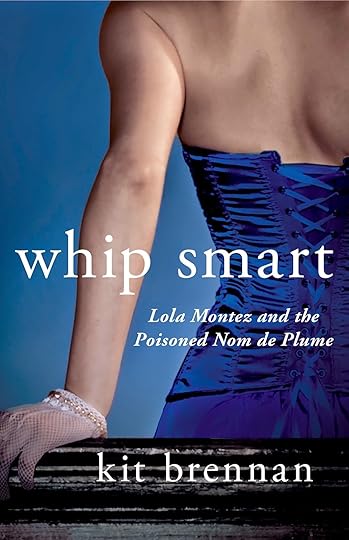 Please welcome Kit Brennan, the author of the Whip Smart series. I asked her to discuss an interesting piece of research she discovered whilst researching her latest book, something she was perhaps unable to include in the story but stayed in her mind nevertheless. She joins us today with her answer.
Please welcome Kit Brennan, the author of the Whip Smart series. I asked her to discuss an interesting piece of research she discovered whilst researching her latest book, something she was perhaps unable to include in the story but stayed in her mind nevertheless. She joins us today with her answer.For the second book in the series, Whip Smart: Lola Montez and the Poisoned Nom de Plume, I researched the newspaper and journalism world of Paris in the 1840s. I found it fascinating that the many newspapers throughout the city were essentially warring with each other to attract and retain the most exciting writers—especially of novels that were gripping and that could be successfully presented to the public in serialization form. This meant that at the end of each chapter, the writer needed to pen a cliff-hanger, to keep readers wanting more. Alexandre Dumas wrote both The Three Musketeers and the incredibly long The Count of Monte Cristo during the same year (1844-45). They ran in serialization concurrently and made Dumas extremely rich. He was at the forefront of writers who understood and took advantage of the public’s hunger for thrilling narratives. I found that appealing: the incredible novels that came out of that place and time were important to society. They were devoured in private, as well as read out loud in streets and salons. The storylines and characters were discussed and debated. These writers became influential and accomplished literary figures: Honoré de Balzac, Victor Hugo, Eugène Sue, to name just a few. George Sand, a woman using a male pen name, forced her way into this world through her talent and was accepted and lauded by her male writer friends. I found that the newspapermen, too, were remarkable, and aggressive with their business acumen. In fierce competition with the other papers, they experimented with formats, costs of subscriptions and advertising, and many a duel were fought over the ensuing quarrels.
 George Sand
George Sandfrom Wiki CommonsSome of the novelists of the day managed to write about real people and events without being sued for libel by penning romans à clef, or novels with a key: the character names and places may be disguised, but if you know the actual persons and events about whom the novelist is writing, you are essentially in on the secret. But even better: as writer, you can also then manipulate the storyline, to make it end differently, say, from the way the real story might have ended. The Parisian's avid enthusiasm for all this in the mid-nineteenth century struck me as very akin to our modern fascination with gossip and celebrities, and with trading that sensational information as quickly as possible.
I am not overly surprised! Writers are a competitive lot nowadays too, though I don't think they're fighting duels... LOL Thank you, Kit, for sharing this fascinating information with us. Good luck with your series.
Readers, here's a blurb:Kit Brennan’s frothy, sexy second in the Whip Smart series opens with the gorgeous, ever-headstrong Lola Montez careening around Europe, on the run from the haunting memories of Spain and the wild adventure that nearly cost her life. It is 1844. Lola encounters celebrated pianist and composer Franz Liszt, who encourages her to set her sights on Paris to establish her dancing career. The night that Lola performs her racy Spider Dance at the Paris Opéra, she meets quite possibly the man of her dreams: Henri Dujarier, co-owner of La Presse newspaper. Lola seems on the verge of breaking Victorian tradition and actually having it all, but forces are at work to keep Lola and Henri apart. Deadly threats and rumors turn into reality, as shadowy figures stop at nothing to sabotage Lola’s new endeavor (unheard of for a woman): to pen an adventure novel, using a nom de plume, about a feisty female character.
You can buy it on Astor + Blue or other leading bookseller sites.
Published on May 12, 2014 00:00
May 10, 2014
Our Reading Radar
Let's see what came across our radar these last two weeks and made it on the ever-growing TBR and wishlist...
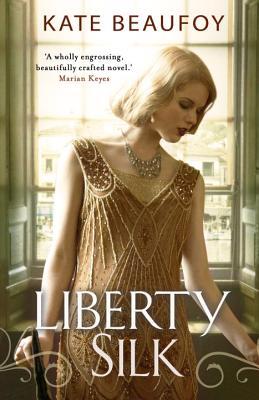 First up, an Australian author. I'm (Tara) hoping it will be on Amazon US. Liberty Silk by Kate Beaufoy. Gorgeous cover, interesting premise.
First up, an Australian author. I'm (Tara) hoping it will be on Amazon US. Liberty Silk by Kate Beaufoy. Gorgeous cover, interesting premise.
A sumptuous summer read starring three inspiring women from three vibrant eras.
One beautiful dress is the key to three brave women's destinies.
France 1919: Jessie is celebrating the last heady days of her honeymoon. But when her husband suddenly disappears she finds herself bereft. Until a chance encounter thrusts her into the centre of the intoxicating world of Parisian high life.
Hollywood 1945: Lisa has come a long way from her quiet, unassuming life in London and is taking Hollywood by storm. But all that glitters is not gold, and as the smoke and mirrors of the lifestyle she so longed for shatter around her there are some secrets she can never escape.
London 1960: Cat, headstrong and independent, drawn to danger and passionately opposed to injustice, has no idea of the legacy that precedes her. Once past secrets are unveiled, she has the chance to find out what liberty really means... An evocative story of survival, betrayal and the invincibility of love.
***
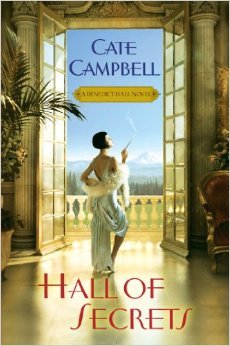 Because I'm enjoying the first book, Benedict Hall--it's got a lady doctor and an engineer for the newly formed Boeing factory--Hall of Secrets by Cate Campbell is on the wishlist now.
Because I'm enjoying the first book, Benedict Hall--it's got a lady doctor and an engineer for the newly formed Boeing factory--Hall of Secrets by Cate Campbell is on the wishlist now.
In Cate Campbell's sumptuously detailed, page-turning series set in 1920s Seattle, the once-secure lifestyle of the wealthy Benedict family--and their household staff--must contend with the radical, roaring Jazz Age. . .
For generations, the Benedicts have been one of Seattle's most distinguished families, residing in the splendid Queen Anne mansion known as Benedict Hall amid a host of loyal servants. But the dawn of the 1920s and the aftermath of the Great War have brought dramatic social conflict. Never has this been more apparent than when daughter Margot's thoroughly modern young cousin, Allison, comes to stay.
But Margot is also shocking many of Seattle's genteel citizens, and her engineer beau, by advocating birth control in her medical practice. For amid a tangle of blackmail, manipulation, and old enmities, the Benedicts stand to lose more than money--they may forfeit the very position and reputation that is their only tether to a rapidly changing world.
***
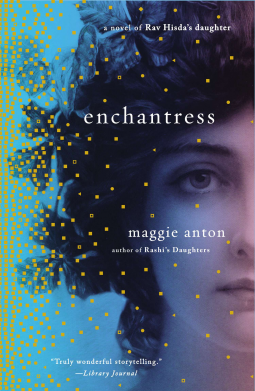 And Shomeret is wanting to read this one: Enchantress by Maggie Anton. It seems she's a fan of this author's works. I hope I got that right, Shomeret. :)
And Shomeret is wanting to read this one: Enchantress by Maggie Anton. It seems she's a fan of this author's works. I hope I got that right, Shomeret. :)
Fantastic tales of demons and the Evil Eye, magical incantations, and powerful attractions abound in Enchantress, a novel that weaves together Talmudic lore, ancient Jewish magic, and a timeless love story set in fourth-century Babylonia.
One of the most powerful practitioner of these mysterious arts is Rav Hisda’s daughter, whose innate awareness allows her to possess the skills men lack. With her husband, Rava--whose arcane knowledge of the secret Torah enables him to create a “man” out of earth and to resurrect another rabbi from death--the two brave an evil sorceress, Ashmedai the Demon King, and even the Angel of Death in their quest to safeguard their people, even while putting their romance at risk.
The author of the acclaimed Rashi’s Daughters series and the award-winningRav Hisda’s Daughter: Apprentice has conjured literary magic in the land where “abracadabra” originated. Based on five years of research and populated with characters from the Talmud, Enchantress brings a pivotal era of Jewish and Christian history to life from the perspective of a courageous and passionate woman.
 First up, an Australian author. I'm (Tara) hoping it will be on Amazon US. Liberty Silk by Kate Beaufoy. Gorgeous cover, interesting premise.
First up, an Australian author. I'm (Tara) hoping it will be on Amazon US. Liberty Silk by Kate Beaufoy. Gorgeous cover, interesting premise.A sumptuous summer read starring three inspiring women from three vibrant eras.
One beautiful dress is the key to three brave women's destinies.
France 1919: Jessie is celebrating the last heady days of her honeymoon. But when her husband suddenly disappears she finds herself bereft. Until a chance encounter thrusts her into the centre of the intoxicating world of Parisian high life.
Hollywood 1945: Lisa has come a long way from her quiet, unassuming life in London and is taking Hollywood by storm. But all that glitters is not gold, and as the smoke and mirrors of the lifestyle she so longed for shatter around her there are some secrets she can never escape.
London 1960: Cat, headstrong and independent, drawn to danger and passionately opposed to injustice, has no idea of the legacy that precedes her. Once past secrets are unveiled, she has the chance to find out what liberty really means... An evocative story of survival, betrayal and the invincibility of love.
***
 Because I'm enjoying the first book, Benedict Hall--it's got a lady doctor and an engineer for the newly formed Boeing factory--Hall of Secrets by Cate Campbell is on the wishlist now.
Because I'm enjoying the first book, Benedict Hall--it's got a lady doctor and an engineer for the newly formed Boeing factory--Hall of Secrets by Cate Campbell is on the wishlist now. In Cate Campbell's sumptuously detailed, page-turning series set in 1920s Seattle, the once-secure lifestyle of the wealthy Benedict family--and their household staff--must contend with the radical, roaring Jazz Age. . .
For generations, the Benedicts have been one of Seattle's most distinguished families, residing in the splendid Queen Anne mansion known as Benedict Hall amid a host of loyal servants. But the dawn of the 1920s and the aftermath of the Great War have brought dramatic social conflict. Never has this been more apparent than when daughter Margot's thoroughly modern young cousin, Allison, comes to stay.
But Margot is also shocking many of Seattle's genteel citizens, and her engineer beau, by advocating birth control in her medical practice. For amid a tangle of blackmail, manipulation, and old enmities, the Benedicts stand to lose more than money--they may forfeit the very position and reputation that is their only tether to a rapidly changing world.
***
 And Shomeret is wanting to read this one: Enchantress by Maggie Anton. It seems she's a fan of this author's works. I hope I got that right, Shomeret. :)
And Shomeret is wanting to read this one: Enchantress by Maggie Anton. It seems she's a fan of this author's works. I hope I got that right, Shomeret. :)Fantastic tales of demons and the Evil Eye, magical incantations, and powerful attractions abound in Enchantress, a novel that weaves together Talmudic lore, ancient Jewish magic, and a timeless love story set in fourth-century Babylonia.
One of the most powerful practitioner of these mysterious arts is Rav Hisda’s daughter, whose innate awareness allows her to possess the skills men lack. With her husband, Rava--whose arcane knowledge of the secret Torah enables him to create a “man” out of earth and to resurrect another rabbi from death--the two brave an evil sorceress, Ashmedai the Demon King, and even the Angel of Death in their quest to safeguard their people, even while putting their romance at risk.
The author of the acclaimed Rashi’s Daughters series and the award-winningRav Hisda’s Daughter: Apprentice has conjured literary magic in the land where “abracadabra” originated. Based on five years of research and populated with characters from the Talmud, Enchantress brings a pivotal era of Jewish and Christian history to life from the perspective of a courageous and passionate woman.
Published on May 10, 2014 00:00
May 9, 2014
S.E.C.R.E.T. Revealed (Secret #3) by L. Marie Adeline

"I wasn't one of those women who would rather be with anyone than alone. Alone was not scary anymore. Alone was challenging, but it was also deeply satisfying. Alone was not lonely."
These SECRET stories by L. Marie Adeline are the only books I read in which I don't skip the sex scenes.
They aren't disgusting or lame. They are about what women want. Each fantasy leaves the woman with a new sense of something...courage, confidence, trust...
What I love about this series is it says/shows that it's okay for women to have sex lives as interesting and exciting as men's. You're not a slut for wanting to have physical pleasure and it's okay to seek a warm body for comfort...just make sure you're doing it for YOURSELF, nobody else. Because you want to, not because you want to please someone else, or worse, feel you have to in order to be loved.
This, book three, introduces us to a new recruit, Solange, an older woman, a mother, a woman who has an ailment many women suffer. She's simply lost interest in sex. It's not worth the time, trouble, mess....you know what I'm saying, ladies.
I feel Solange is a much better character and much easier to relate to than book two's young girl. Her fantasies are exciting and she leaves each step with a lesson learned, something I feel we missed out on in book two but that was very strong in book one.
Cassie... I think her story should have ended with book one. She walked away from that story so cool and amazing, and then in book two it started going downhill. SHE went downhill. I just can't seem to like her anymore. I'm so over Will. OVER him. Sadly, she's not. I guess like with most series involving women and love, there's a Team Will and a Team Jesse. I was Team Jesse and I still think Cassie has treated him like crap, but as I read this, I kept thinking about the quote posted at the beginning of this review...and sadly, while Cassie THINKS this, she certainly doesn't live by it. When one man isn't interested, she pounces on the other one and back and forth we go and this, to me, does not say, "I'm a woman who isn't afraid of being alone." On the contrary, I felt Cassie was unable to be alone and was going against the very quote I liked from her. And I have to ask...just how did SECRET empower her? It doesn't seem to have worked.
At some point in the story I got tired of the Will/Jesse thing and I became a member of Team No-Man At All. Needless to say, I loathed the ending of this story. LOATHED it.
The twist Pierre felt out of place as well.
Cassie's story this time though does bring up some new issues in SECRET, mainly jealously. It's going to happen. I find myself interested in seeing how this was going to be handled by everyone involved.
Didn't love it like I did the first one, am a bit on the fence really with how I feel about where this series went, and I def think there was more sex than story this time, but the morals were there. I still really wish we had a SECRET club for real.
I received this via Netalley.

Published on May 09, 2014 00:00
May 8, 2014
The Highwayman's Daughter by Henriette Gyland
 This was a super fun historical romp. I love me some highway-women/bandit ladies.
This was a super fun historical romp. I love me some highway-women/bandit ladies.Cora is a such a lady. She holds up the rich folks' carriages and takes their fancy baubles to buy her ailing father some medicine. But of course, it's only a matter of time before she gets caught and back then, robbery was a hanging offense...
It's all going to come down to who gets to her first: Jack, who figures out who she really is and knows more about her than she does (you'll have to read the book to figure that out) and has only good intentions, or his horrid, somewhat OTT cousin who def does not have the best of intentions, not towards Cora, not towards Jack...
As I said above this was fun. I love how Cora does little humorous things here and there, taking his pants, leaving only a yellow dress. She's in a time (1700s) when women were not respected or allowed to be this way and she breaks all the rules. And though Jack has to come to her rescue more than once, in the end, she comes to the rescue too. It's like 50/50. I like that.
There's secrets from the past dredged up, some realistic scenes in Newgate prison, a hanging, lots of horsemanship, and it really had a strong historical feel. Sometimes with these historical romances, there's a story that could really occur just about whenever and I find that disappointing. That is not the case with this story. The streets, the horses, the manors, the labor life, the clothing...exceptionally done. I felt transported.
And I really really like the hero in this story. He doesn't try dominate the heroine. There's no "I must be mega alpha and prove how manly I am over this wench" nonsense. Thank goodness. The hero is comfortable and confident with himself. He accepts Cora for who she is.
My main quibble: The romance was fast. I don't see how you can love a woman you've spoken to all of two times and who, the first time, held you at rapier point and robbed you. I'd have also liked more robberies. Naughty me. LOL
I received this from Choc Lit Publishing in exchange for an honest review.

Published on May 08, 2014 00:00
May 7, 2014
Ten Questions from Tara: Interview with Glen Thomas Hierlmeier
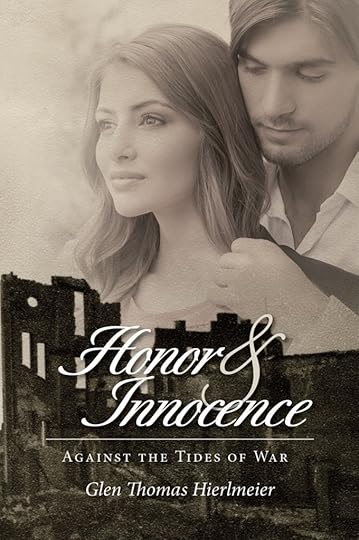 Tara: Welcome. You’re here to promote Honor and Innocence, a historical romance novel. Tell me, please, what was the inspiration behind this story? How did it come to you?
Tara: Welcome. You’re here to promote Honor and Innocence, a historical romance novel. Tell me, please, what was the inspiration behind this story? How did it come to you?Readers, here is the blurb real quick:
Hank Fischer is drafted into the American Army soon after high school graduation in 1945, beginning a six month saga of intrigue, horror, and love that takes him from his southern Wisconsin home to Texas, then Germany, Switzerland, Greece, and Singapore, revealing along the way the devastating truth of the tragic consequences of war. In the Texas prisoner of war camp where Germans were interned, a youthful and naïve Hank is targeted by Haynes who becomes his lifelong tormentor, but he also begins his closest, nearly unimaginable lifelong friendship with Max, a German prisoner of war under his supervision, whose twin sister, Roberta, back in their German homeland, is destined to become the love of his life. Hank is drawn into a dangerous web of intrigue by the common heritage he shares with Max, a prisoner of war being returned to his homeland, and the intense love he finds with Roberta. Because of their ties to the SS through their father, a senior Nazi official hand-selected by Adolph Hitler himself, Max and Roberta are pursued by the Intelligence Forces of the American and British Occupation. Hank is faced with the colossal choice between his allegiance to the U.S. Army and his love for Roberta. Hank chooses to collaborate with Max and free Roberta from a British prison camp, beginning a desperate flight through war-torn Germany where they witness first-hand the ravages of post –war Europe, while staying perilously ahead of pursuing forces. Their flight takes them to a secret refuge in the mountains of neutral Switzerland where Lazlo, a Hungarian born war-time profiteer provides the opportunity for their escape. Sadly leaving Max behind in Switzerland they set out for the port city of Trieste by train, only to survive an attack by post-war Italian Army pirates, then sail the seas on a merchant ship with a modern day Greek philosopher, Captain Koz, to search out hidden treasure in a small Greek village. Again forced to flee, Captain Koz helps them find refuge across the Indian Ocean, in Singapore, only to once again face the bane of powerful men…another war-torn country. Their very survival hangs in the delicate balance between their powerful love and will to live, and evil man’s violent quest for power and wealth. Their amazing journey, immersed in horrors of war, bombed-out cities, dead bodies, displaced person by the millions, desperation and hopelessness, give the reader a rare look at the despair of victims of the hubris of men seeking power for the sake of power, amidst their powerful love story.
Glen: Every romance has a dark side. When that dark side is war, hell has no mercy. Through hardship and suffering, the bond of love grows strong.
In Honor & Innocence: Against the Tides of War, I wanted to portray how war effects people who are innocently caught up in the hubris of powerful leaders bent on destruction, and how their honor is tested by desperate circumstances. All of my stories begin with what a close friend, and one of my trusted readers, once referred to as a “golden nugget”, a special moment or event that is unique and memorable. I find that “golden nugget”, then build a story around it.
I found such a nugget in researching my first book, We Had to Live: We Had No Choice. It’s a true story based on the genealogy of my family, tracing my mother’s side of the family from the immigration of her great-great-great grandfather from Liverpool, England in 1773 as an indentured servant, crossing the Atlantic on a slave ship to work on a Virginia plantation. In seeking to understand the family legacy, I extensively interviewed my oldest brother, Hank, the one living person whose life spanned the longest period of time in the family history. He shared many stories and experiences, one of which was particularly fascinating, a “golden nugget”, but not appropriate to include in that first book.
As a U.S. Army soldier in WWII, fresh out of high school, Hank escorted German prisoners-of-war back to Germany from an American prison camp in Texas. I knew all about the Japanese internment camps in California, but I had no idea there were such camps in America for Germans and Italians, and I felt compelled to investigate the historical period just after the war. As I continued my research I realized that much of the post-war experience around the world is largely overlooked in history books.
I used my brother’s story as a key passage, a “golden nugget”, in the novel that unfolded. Because so much of our lives is experienced through romantic relationships I chose to weave a love story around the horrific experiences of common citizens caught in turmoil not of their choosing---Americans, Germans, and many others, caught up by the times. I hoped to captivate my reading audience with fascinating characters, an intense and improbable love story, and historical revelations largely ignored in our written history.
Tara: Wow. I think your family history is fascinating and I imagine you are very proud of your brother.
We focus a lot on heroines here on Book Babe. Tell me what makes your heroine strong.
Glen: Roberta Schoellkopf, a young German girl, is the primary heroine in the story, although there are several other strong women who could be considered heroines as well. Berta is only 18 years old, but due to the travails of war and the absence of her family, she loses everything she depended on in life. On her own, she must learn difficult lessons quickly, but not without making mistakes. She demonstrates the ability to persevere and to overcome her failures and shortcomings, and proves to be a very faithful and strong companion. Ultimately, in spite of great adversity and loss, she becomes the great woman she aspires to be.
Tara: Did any particular woman in your family or life help inspire some of her traits?
Glen: I come from a family of 13, including 7 sisters. I am a great admirer of my mother and my sisters, all strong women. I know the challenges they have faced in their lives without losing their dignity and purpose. Much of what I have accomplished in my life is attributable to their example and encouragement. I think my female characters represent the kinds of qualities I found in them.
Tara: What makes her sexy?
Glen: My book has been referred to as “low heat level”. I know that has to do with physical sex and certainly the label does apply, by intent. While she is presented as a very beautiful girl, I wanted Roberta to be an extremely attractive woman for her personal values and attributes, particularly her willingness to make her own way and be her own person. With all the sex in romance novels, I wanted to present a strong woman who is very desirable for her character, and her moral and ethical values, and for the adversity she faces and overcomes. She is the kind of intelligent person a man would love to be shoulder-to-shoulder and back-to-back with under extreme duress. She more than holds her own, while also being very lovely and provocative.
One scene in the book, where the hero and heroine first meet, is analogously based on my first meeting with my wife, RuthAnn. RuthAnn has the qualities I tried to portray in Roberta.
 Tara: "A strong woman desirable for her character"...that's exactly what we look for here on Book Babe, Glen. So many people think sexiness is only about physical traits. Not the case. Thank you.
Tara: "A strong woman desirable for her character"...that's exactly what we look for here on Book Babe, Glen. So many people think sexiness is only about physical traits. Not the case. Thank you.So, what kind of research did you do when you penned this novel? Did anything surprising come up in your search?
Glen: You know from my answer to question #1 above, that this story actually evolved from my research for my first book, We Had to Live: We Had No Choice. A story my brother related about his experience as an American soldier responsible for German prisoners stuck in my mind; my “golden nugget”, leading me to research the circumstances following WWII. I was amazed at how much I found out that I had never known---a view of history not generally recorded in history books that had become very personal to me because of my brother’s experience.
Perhaps not surprisingly, my research for Honor & Innocence, has also led to revelations that have piqued my interest. When I began writing the book, I did not have in mind to write another or two, but I discovered so much historical information that is relatively unknown that I decided to continue my research and perhaps write two more books. My group of intimate readers were so taken by some of the supporting characters that I have decided to write two more books following the experiences of those characters, Lazlo and Koz, and tie them back to the first book. The second book is well underway, and I hope to have it published by September of this year.
Tara: What would you like readers to gain from reading your book? Is there a strong moral? Do you hope they will laugh, learn something, ponder a point?
Glen: I particularly appreciate this question. Yes, it is extremely important to me to accomplish the following with my writing:
Learn and understand history from a new perspective.
Understand the importance of moral and ethical values and how these attributes will be severely tested in life.
Love, fear, or hate the characters.
Feel empathy for others regardless of prejudice, hatred, religion, nationality.
Laugh.
Cry.
Ponder how they might react under similar circumstances.
Tara: I LOVE that answer! I feel that way when I read a book. I want to laugh, cry, have some emotion invoked, or learn something new.
Now let’s talk about your hero. What draws the heroine to him? Does he have some of your own traits or traits you wished you had?
Glen: I prefer to think of my hero as having the attributes of my brother, Hank, who passed away during the writing of this book, just five days short of his 86th birthday, although I certainly have aspired to have the qualities of character that he modeled for me.
The initial meeting finds my heroine under great duress and therefore particularly vulnerable. The initial characteristics that draw her to the hero are his gentleness and empathy. As they are confronted with obstacles, they each prove to be very intelligent, resourceful, and strong. Finding themselves in need of each other, they learn to trust one other and are drawn inexorably close through mutual respect and by overcoming difficult circumstances, leading to their joint quest for peace, harmony, and happiness.
Tara: I'm really sorry about your brother's passing. I imagine, however, his spirit is very proud to be in your book.
Your book takes place in many places. If I were a tourist, what in your novel would you recommend I see?
 Dolder Grand Hotel
Dolder Grand HotelWiki Commons
Glen: There are numerous fascinating locations where the story takes place as it moves from Wisconsin to Mineral Springs, Texas, to Germany, Switzerland, Italy, Greece, Singapore, and Australia. I wanted to give the reader a perspective of what was happening in each of those places post-war, while confronting Hank and Roberta with obstacles unique to those locations.
The highlights for me, those places I would most like to see, are as follows:
Hamburg, Germany – to see what remains of the devastation of the city
Zurich, Switzerland – to see the grandeur of Lake Zurich, the mountains, and stay at The Dolder Grand Hotel where Hank and Roberta met Lazlo.
Casa dei Pagani, in the mountains of Italy – a serene mountain location with a mystical past
Kapsia, Greece – the romantic retreat in the Greek countryside south of Athens
Singapore – to look for Puteh
Tara: That's a lovely hotel. I want to go there too! LOL A more personal question. What’s the one thing you hope to accomplish before you die? Your main goal?
Glen: Above all, to provide a living example of moral and ethical values to my wife, children and grandchildren.
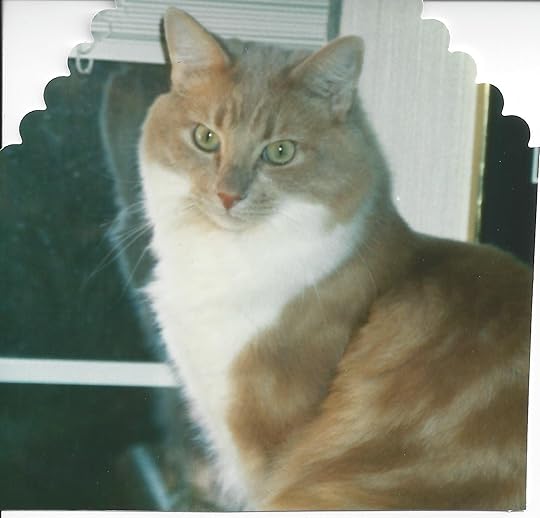 Tara: I’m a dog mom, so I always ask this. Do you have pets? If so, tell me about them and do provide pictures.
Tara: I’m a dog mom, so I always ask this. Do you have pets? If so, tell me about them and do provide pictures.Glen: We were cat lovers, particularly RuthAnn. However, the passing of our beloved Koko several years ago at the age of 17 was a particularly traumatic experience. In winter he would sleep on my feet because he knew they would be cold---in summer he would sleep on RuthAnn’s---I think because he knew I didn’t need him in summer. We have his remains in an urn on a shelf in her office alongside those of her previous cat, Ulysses. They will go with us wherever we may go, and beyond, and I guess, now, irreplaceable.
Tara: It's heartbreaking to lose a pet. They are like children. Seventeen is an excellent lifespan though. Koko must have been very well cared for.
Thank you for visiting Book Babe today, Glen, and good luck with your book.
***
 Glen graduated from the United States Air Force Academy in Colorado Springs, Colorado, then earned a Masters of Business Administration at The University of Wisconsin at Madison. He served in the US Air Force on the Manned Orbiting Laboratory space exploration program and on the design phase of the development of the F-15 fighter aircraft. After leaving the Air Force, Glen returned to Wisconsin and became Vice President of the largest bank in his home state, First Wisconsin National Bank. In 1979, he moved on to become President and CEO of several real estate development and management companies. Glen retired in 2009 to devote full time to his grandchildren and his writing. Glen is the author of Honor and Innocence, We Had to Live: We Had No Choice…, and Thoughts From Yesterday: Moments to Remember.
Glen graduated from the United States Air Force Academy in Colorado Springs, Colorado, then earned a Masters of Business Administration at The University of Wisconsin at Madison. He served in the US Air Force on the Manned Orbiting Laboratory space exploration program and on the design phase of the development of the F-15 fighter aircraft. After leaving the Air Force, Glen returned to Wisconsin and became Vice President of the largest bank in his home state, First Wisconsin National Bank. In 1979, he moved on to become President and CEO of several real estate development and management companies. Glen retired in 2009 to devote full time to his grandchildren and his writing. Glen is the author of Honor and Innocence, We Had to Live: We Had No Choice…, and Thoughts From Yesterday: Moments to Remember.
Published on May 07, 2014 00:00
May 6, 2014
All My Tomorrows by Ellie Dean
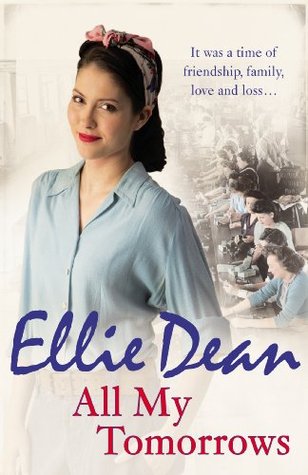 This novel somewhat reminds me of those British television dramas I’m so fond of. Lots of drama. It’s a good story full of (mostly) good people, people you come to care about as the story continues. The problem for me is it’s awful long and it’s nothing but drama and everyday life. Every story should have some of that, but I like a little something more in my books. I like to walk away with a good laugh or some new bit of knowledge. Though the story takes place during the war and the heroine works in a factory, there’s not a whole lot of detail about that stuff. Next to none, to be honest. Oh, they sit in shelters and they have rationing coupons, but I’m especially disappointed in the lack of factory life as that bit is what drew me to this story to begin with.
This novel somewhat reminds me of those British television dramas I’m so fond of. Lots of drama. It’s a good story full of (mostly) good people, people you come to care about as the story continues. The problem for me is it’s awful long and it’s nothing but drama and everyday life. Every story should have some of that, but I like a little something more in my books. I like to walk away with a good laugh or some new bit of knowledge. Though the story takes place during the war and the heroine works in a factory, there’s not a whole lot of detail about that stuff. Next to none, to be honest. Oh, they sit in shelters and they have rationing coupons, but I’m especially disappointed in the lack of factory life as that bit is what drew me to this story to begin with.This is part of a series, but except for some references to Rosie and her problems, I never felt I was lost.
It’s a tad predictable. That has to be the second biggest downside, but it’s enjoyable enough that that’s not overly bothersome.
I was very easily able to get “lost” in the tale for four days. The heroines are Ruby and Peggy. Ruby is young and at first, I thought, “Oh no…a woman who lets herself get smacked around..ugh.” But she finds her backbone and then some. I think my favorite scene is when she stands up to Doris, but I digress. I appreciate Ruby’s story—battered wife trying to make it on her own, growing braver with each day, taking risks by up and moving from all she’s known and finding a job and a new home and opening up to people. Peggy is a strong older lady whose husband is off to war and has her own battles as her health declines and her home is bombed…but nothing…and I mean nothing stops this incredible woman from opening her home and her heart to other people, especially young girls in trouble, like Ruby.
Peggy is a fabulous role model.
We get brief looks at the other girls, such as Rita, who rides a motorbike and works as a firegirl, but you have to read their books to get their stories. This just offers teasers of sorts.
I enjoyed it, but like I said above, I just like more in my books. If this was a TV drama on BBC, I’d be all over the series, but at 500-some pages per book, I want more of the war, of the factories, of the motorbiking. More of that interesting stuff, less drama and personal problems.
I received this via Netgalley.

Published on May 06, 2014 00:00



